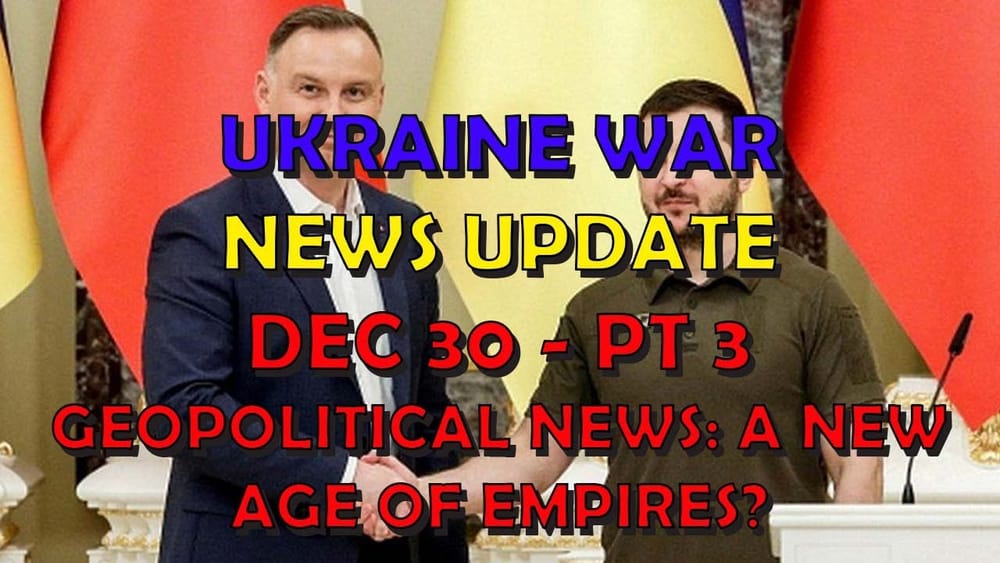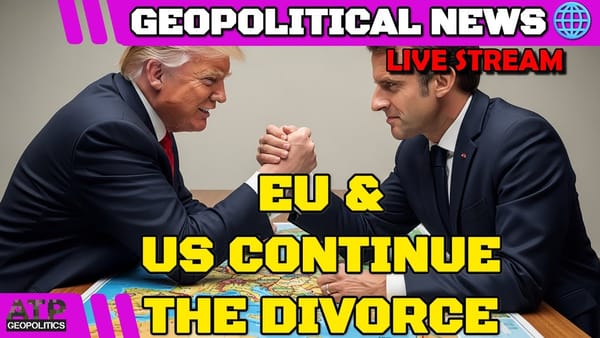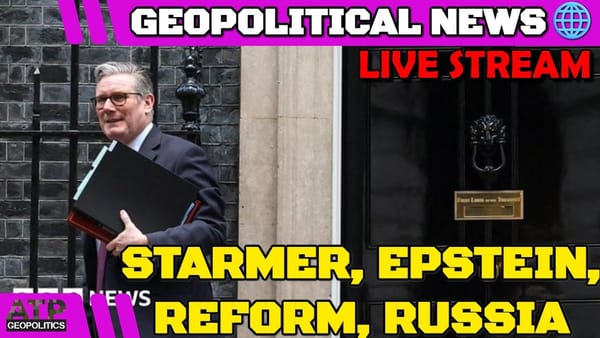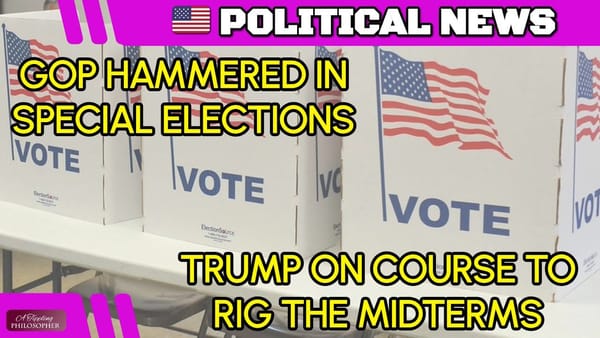Ukraine War Update NEWS: Geopolitical News: New Age of Empires
Table of Contents 📖
"What is the difference between the US's position on taking Greenland off Denmark, you know, forcefully, and Russia invading Ukraine? I think there's very little functional difference."
Hello Team
🎦 00:00-00:21⏩
Jonathan welcomes viewers to another ATP Geopolitics video, a Ukraine War News Update - part three, focusing on geopolitics. He acknowledges the holiday season but emphasizes that war doesn't stop for celebrations.
Return to top⤴️
Latvia considers seizing Russian Shadow Fleet ships
🎦 00:21-01:08⏩
Jonathan discusses Russia's ongoing hybrid warfare, particularly targeting Ukraine's allies. He highlights reports of Russian and Chinese ships damaging submarine cables in the Baltic Sea. Jonathan expresses support for the Latvian Prime Minister's statement about potentially seizing ships of the Russian Shadow Fleet to protect critical infrastructure. He believes that strong, decisive responses are necessary to deter Russia's aggressive actions.
Return to top⤴️
Swedish Social Democrats call for NATO Article 4 activation
🎦 01:08-02:07⏩
Jonathan reports that the Swedish Social Democrats are urging their government to push for the activation of NATO's Article 4 due to Russia's hybrid warfare in the Baltic Sea. He believes that Article 4 should have been triggered already, given Russia's actions.
Return to top⤴️
NATO Articles 1-5 explained
🎦 02:07-06:50⏩
Jonathan provides a detailed explanation of NATO Articles 1 through 5, emphasizing the significance of Article 4 as a precursor to Article 5.
- Article 1: Peaceful settlement of international disputes.
- Article 2: Promotion of peaceful and friendly international relations through cooperation and understanding.
- Article 3: Commitment to maintain and develop individual and collective capacity to resist armed attacks (e.g., 2% GDP defense spending target).
- Article 4: Consultation among parties when territorial integrity, political independence, or security of any member is threatened.
- Article 5: Collective defense principle - an attack against one is considered an attack against all.
Slovakian PM criticises Zelenskyy's decision on Russian gas transit
🎦 06:50-08:22⏩
Jonathan reports on the Slovakian Prime Minister's criticism of Zelenskyy's decision to end Russian gas transit through Ukraine after 2024. The Slovakian PM warns of potential retaliation by refusing to sell electricity back to Ukraine when needed, despite Ukraine's damaged energy infrastructure.
Return to top⤴️
Poland offers support for Ukraine's energy needs
🎦 08:22-08:44⏩
Jonathan highlights Poland's offer to help Ukraine if Slovakia cuts off electricity. Poland is prepared to increase domestic electricity production to offset any shortfall, countering Slovakia's threat. Jonathan views this as a positive move by Poland and a setback for Slovakia, as they lose both gas transit fees and electricity sales.
Return to top⤴️
Poland to close border with Belarus with a wall
🎦 08:44-10:04⏩
Jonathan reports that Poland plans to build a 418km wall along its border with Belarus by summer 2025, equipped with night vision and thermal imaging cameras. A new road will also be built for patrolling the border area.
Return to top⤴️
Poland's planned highway to Kaliningrad
🎦 10:04-10:18⏩
Jonathan mentions Poland's plans to construct a highway to Kaliningrad, the Russian exclave on the Baltic Sea. The highway is intended for military purposes, enabling rapid deployment of equipment to Kaliningrad in case of conflict with Russia.
Return to top⤴️
NATO's logistical preparedness for potential conflict
🎦 10:18-10:18⏩
Jonathan connects Poland's highway project with broader NATO discussions about logistical preparedness for a potential conflict with Russia. He highlights the need for robust infrastructure, including roads and railways, capable of handling the transportation of heavy military equipment across Europe.
Return to top⤴️
Protests in Georgia and the need for Western support
🎦 10:18-10:53⏩
Jonathan discusses ongoing protests in Georgia, referencing reports from Euromaidan Press about demonstrations outside the presidential palace in Tbilisi. He emphasizes the importance of strong Western support for Georgia during this critical juncture. He believes that a pro-Western Georgia would send a strong message to the Kremlin and influence the geopolitical direction of the entire region, including Armenia and Azerbaijan.
Return to top⤴️
German political landscape and upcoming elections
🎦 10:53-16:22⏩
Jonathan delves into the German political landscape ahead of upcoming elections, referencing a comment from a viewer named Echo.
- Fragmentation: The next Bundestag (German parliament) is expected to be fragmented with at least four, possibly seven parties.
- Key Players: The CDU (Christian Democratic Union) is projected to be the strongest party (31%), followed by the far-right AfD (Alternative for Germany) at 19.5%, raising concerns. The current Chancellor Olaf Scholz's SPD (Social Democratic Party) is trailing at 16%, followed by the Greens (12.5%).
- Coalition Scenarios: None of the major parties are willing to form a coalition with the AfD. A "GroKo" (grand coalition) between the CDU and SPD (center-right and center-left) is possible but could lead to political stalemate. A coalition between the CDU and the Greens is another option.
- Potential Impact on Ukraine: Echo's assessment suggests that regardless of the coalition's composition, there will likely be increased support for Ukraine. Politicians within the SPD who cling to an outdated, pro-Russia stance are expected to lose influence.
Jonathan appreciates Echo's detailed analysis and believes it provides a helpful overview of the German political situation and its potential implications for Ukraine.
Return to top⤴️
Zelenskyy's discussion with Trudeau on G7 priorities
🎦 16:22-18:16⏩
Jonathan shifts focus to Canada, reporting on Zelenskyy's conversation with Prime Minister Justin Trudeau. He mentions Canada's upcoming G7 presidency and their discussions about strengthening sanctions against Russia, specifically targeting propaganda networks and shadow fleets. Jonathan expresses hope that Trudeau will maintain a strong stance against Russia. However, he notes that the Liberal Party has been in power for 10 years and may face challenges in the next election. Jonathan suggests that a potential Conservative victory could weaken Canada's support for Ukraine, posing a concern for G7 unity.
Return to top⤴️
Trump's foreign policy and Russia's perception
🎦 18:16-23:29⏩
Jonathan examines an article from the Daily Beast about Trump's foreign policy pronouncements and how they are perceived in Russia.
- Trump's Statements: Trump's statements about potentially annexing Greenland, Canada, and the Panama Canal have raised concerns among allies and emboldened adversaries like Russia.
- Russian Propaganda: Russian propagandists, including Vladimir Solovyov, interpret Trump's statements as evidence that he is not opposed to wars of conquest. They argue that Trump's rhetoric legitimizes Russia's own imperial ambitions, citing his praise for Putin's annexation of Crimea as "genius" and "savvy."
- Negotiations with Kellogg: Russian propagandists are wary of negotiating with retired Lieutenant General Keith Kellogg, Trump's former Ukraine envoy, because they see him as too knowledgeable. They prefer direct engagement with Trump, hoping to bypass tougher negotiations.
- Russia's "Dream Scenario": Their ideal outcome involves legitimizing Russia's invasion of Ukraine and recognizing its territorial demands.
Jonathan expresses deep concern about the implications of Trump's rhetoric, arguing that it undermines international norms and emboldens authoritarian aggression.
Return to top⤴️
Trump's impact on international relations
🎦 23:29-26:36⏩
Jonathan continues his analysis of Trump's impact on international relations.
- Legitimizing Russian Imperialism: Jonathan reiterates his argument that Trump's words and actions provide a dangerous validation of Russia's imperial ambitions. He highlights quotes from Russian propagandists, such as Dmitry Kulikov, who believe that Trump's behavior signals a return to an era of empires where military force dictates international relations.
- European Silence: Jonathan criticizes European leaders for their silence and inaction in the face of Trump's destructive rhetoric. He believes they were too afraid of jeopardizing Trump's support for the EU on other issues, such as Ukraine, to challenge his dangerous pronouncements.
- Dangers of "America First": Jonathan condemns the "America First" approach, arguing that it ultimately harms global security and creates a more chaotic world. He believes that the pursuit of narrow national interests at the expense of international cooperation emboldens authoritarian leaders and undermines the rules-based international order.
Jonathan maintains that Trump's foreign policy has been disastrous for global stability and security, arguing that his actions have emboldened adversaries like Russia and China while alienating allies.
Return to top⤴️
The New Age of Empires
🎦 26:36-39:30⏩
Jonathan pivots to a broader discussion about the concept of a "New Age of Empires," prompted by the ideas of Guy Verhofstadt, former Prime Minister of Belgium and a prominent EU figure.
- Competing Power Blocs: Verhofstadt argues that the world is shifting towards a system of competing empires or power blocs. He identifies the US, China, India, the UK, Russia, and the EU as the key players in this emerging landscape.
- The Need for EU Unity: Verhofstadt stresses that the EU must become more unified and assertive to compete effectively in this new world order. He calls for increased military spending, a stronger European pillar within NATO, and a more coherent foreign policy.
- Ukraine War as a Test Case: Jonathan believes that the war in Ukraine is a prime example of this new geopolitical reality. Countries are being forced to choose sides, aligning themselves with one of the major power blocs.
- Challenges for the EU: Jonathan acknowledges Verhofstadt's concerns about the EU's ability to act decisively on the world stage. He cites internal divisions within the EU on issues like the Israeli-Palestinian conflict and Russia's invasion of Ukraine as evidence of this challenge.
Jonathan finds Verhofstadt's analysis compelling, suggesting that understanding the world through the lens of competing empires could be crucial for navigating the current geopolitical climate. He plans to explore this concept further in future videos.
Return to top⤴️
Russian officials visit the US
🎦 39:30-39:30⏩
Jonathan mentions reports of high-ranking Russian officials visiting the United States, citing information from Anton Gerashchenko about a plane belonging to Putin's administration arriving in Washington and New York on December 25th.
Return to top⤴️
Potential Trump-Russia negotiations
🎦 39:30-34:09⏩
Jonathan discusses the potential implications of the reported Russian delegation's visit to the US.
- Diplomatic Rotation or Secret Negotiations?: While the Russian Foreign Ministry claims the visit was a routine diplomatic rotation, the timing raises suspicions, especially given Lavrov's recent statements. Jonathan speculates that the visit might be related to backchannel negotiations between the incoming Trump administration and Russia, potentially bypassing the current Biden administration.
- Lavrov's Comments: Jonathan finds Lavrov's statement about Trump's alleged proposal to postpone Ukrainian NATO membership for 20 years and deploy peacekeeping forces to Ukraine "hilarious." He interprets Lavrov's insistence on "credible, legally binding agreements" as a thinly veiled attempt to secure a weak Ukraine under Russian control.
- Potential for Discord: Jonathan expresses concern that these potential negotiations, if true, could create further discord and sow distrust between the US and its allies, particularly in Europe. He worries about the long-term consequences of Trump's foreign policy for global security and the rules-based international order.
Ramaswamy's claim about Musk's allegiance to China
🎦 34:09-35:48⏩
Jonathan touches on the relationship between Elon Musk and China, citing a comment from Shashank Joshi about Vivek Ramaswamy's claim that "Musk will jump like a circus monkey when Xi Jinping calls in the hour of need." Jonathan agrees with this assessment, arguing that Musk is beholden to China due to Tesla's significant operations there. He criticizes the quid pro quo that allows Tesla to operate independently in China while no other foreign entity enjoys such privileges, questioning the compromises Musk might be making to maintain this arrangement.
Return to top⤴️
Ukraine's Foreign Minister visits Syria
🎦 35:48-37:39⏩
Jonathan reports on the Ukrainian Foreign Minister's visit to Syria, meeting with Bashar al-Assad and other officials.
- Boosting Diplomatic Ties: The visit aims to strengthen diplomatic ties between Ukraine and Syria, with Zelenskyy awaiting a report on the outcomes.
- Jelani's Transformation: Jonathan notes that Jelani, the former leader of HTS (Hay'at Tahrir al-Sham) and a former al-Qaeda affiliate, now appears to be the de facto ruler of Syria. He acknowledges concerns about Jelani's past but also highlights his perceived moderation in recent years and the potential for him to foster a more pluralistic society in Syria.
- Ukraine's Objectives: Jonathan speculates that Ukraine likely wants to leverage its grain exports and expertise in war crimes investigations to encourage Syria to expel Russian forces from the country.
- Food Aid and Expertise Sharing: Ukraine is providing food aid to Syria, which has faced significant challenges. Additionally, Ukraine is sharing its expertise in war crimes investigation, evidence collection, and analysis to assist Syria in holding perpetrators accountable.
Jonathan sees this visit as a strategic move by Ukraine to weaken Russia's influence in the Middle East and gain a potential ally in the region.
Return to top⤴️
Wrap Up
🎦 37:39-39:38⏩
Jonathan concludes the video by reflecting on the recurring theme of a "New Age of Empires." He plans to delve deeper into this concept, examining Guy Verhofstadt's analysis of the evolving global order. Jonathan emphasizes the importance of understanding the interconnectedness of military, political, and economic factors in international relations. He believes that the war in Ukraine has highlighted the need for a stronger and more unified EU, capable of acting decisively on the world stage. Jonathan thanks his viewers for watching and promises to continue providing insights into these critical geopolitical developments.
Return to top⤴️




